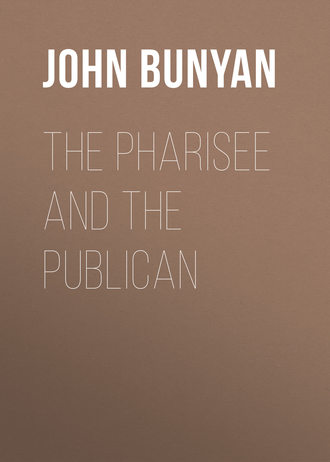 полная версия
полная версияThe Pharisee and the Publican
At another time, when my heart is more hard and stupid, and when his terror doth not make me afraid, then I can come before him, and ask mercy at his hand, and scarce be sensible of sin or grace, or that indeed I am before God. But above all, they are the rare times, when I can go to God as the Publican, sensible of his glorious majesty, sensible of my misery, and bear up, and affectionately cry, “God me merciful to me a sinner.”
But again, the Publican, by his confession, sheweth a piece of the highest wisdom that a mortal man can shew; because; by so doing, he engageth as well as imploreth the grace and mercy of God to save him. You see by the text he imploreth it; and now I will shew you that he engageth it, and makes himself a sharer in it.
“He that covereth his sins shall not prosper; but whoso confesseth and forsaketh them shall have mercy.” And again, “If we confess our sins, he is faithful and just to forgive us our sins and to cleanse us from all unrighteousness;” Prov. xxviii. 13; 1 John. i. 9.
First, In the promise of pardon, “he shall have mercy;” he shall have his sins forgiven. As also Solomon prays, that God will forgive them that know their own sores; and they are indeed such as are sensible of the plague of their own heart, 2 Chron. vi. 29, 30; 1 Kings viii. 37, 38. And the reason is, because the sinner is now driven to the farthest point, for confession is the farthest point, and the utmost bound unto which God has appointed the Publican to go, with reference to his work; as it is said of Saul to David, when he was about to give him Michal his daughter to wife, “I desire not any dowry, but an hundred foreskins of the Philistines, to be avenged of the king’s enemies.”
So says God in this matter, I desire no sacrifices, nor legal righteousness to make thee acceptable to me: “Only acknowledge and confess thine iniquity, that thou hast transgressed against me,” 1 Sam. xviii. 25; Jer. iii. 12, 13. And though this by some may be thought to be a very easy way to come at, and partake of the mercy of God; yet let the sensible sinner try it, and he shall find it one of the hardest things in the world. And there are two things to which man is prone, that makes confession hard:
First, There is a great proneness in us to be partial, and not thorough and plain in our confessions. We are apt to make half confessions; to confess some, and hide some; or else to make feigned confessions, flattering both ourselves, and also God, while we make confession unto him; or else to confess sin, as our own fancies apprehend, and not as the word descries them. These things we are very prone to do; men can confess little sins, while they hide great ones. Men can feign themselves sorry for sin when they are not, or else in their confessions forget to judge of sin by the word. Hence it is said, They turned to God, “not with their whole hearts, but as it were feignedly.” “They spake not aright, saying, What have I done?” “They flatter him with their mouth, and lie unto him with their tongues,” and do their wickedness in the dark, and sin against him with a high hand, and then come to him and “cover the altar with their tears.” These things therefore demonstrate the difficulty of sincere confession of sin; and that to do it as it should, is no such easy thing.
To right confession of sin, several things must go: as,
1. There must be sound conviction for sin upon the spirit: for before a man shall be convinced of the nature, aggravation, and evil of sin, how shall he make godly confession of it? Now, to convince the soul of sin, the law must be set home upon the conscience by the Spirit of God: “For by the law is the knowledge of sin.” And again, “I had not known lust, unless the law had said, Thou shalt not covet;” Rom. vii. 7. This law, now when it effectually ministereth conviction—of sin to the conscience, doth it by putting of life, and strength, and terror into sin. By its working on the conscience, it makes sin revive, “and the strength of sin is the law;” Rom. vii.; 1 Cor. xv. It also increaseth and multiplieth sin, both by the revelation of God’s anger against the soul, and also by mustering up and calling to view sins committed and forgotten time out of mind. Sin seen in the glass of the law is a terrible thing; no man can behold it and live. “When the commandment came, sin revived, and I died;” when it came from God to my conscience, as managed by an almighty arm, then it slew me. And now is the time to confess sin, because now a soul knows what it is, and sees what it is, both in the nature and consequence of it.
2. To a right confession of sin, there must be sound knowledge of God, especially as to his justice, holiness, righteousness, and purity; wherefore the Publican here begins his confession by calling upon or by the acknowledgement of his Majesty: “God be merciful to me a sinner:” As if he should say, God, O God, O great God, O sin-revenging God, I have sinned against thee, I have broken thy law, I have opposed thy holiness, thy justice, thy law, and thy righteous will. O consuming fire (“for our God is a consuming fire”), I have justly provoked thee to wrath, and to take vengeance on me for my transgressions. But alas! how few that make confession of sin have right apprehension of God, unto whom confession of sin doth belong. Alas! it is easy for men to entertain such apprehensions of God as shall please their own humours, to bear up under the sense of sin, and that shall make their confession rather facile and fantastical, than solid and heartbreaking. The sight and knowledge of the great God is, to sinful man, the most dreadful thing in the world; which makes confession of sin so rare. Most men confess their sins behind God’s back, but few to his face; and you know there is ofttimes a vast difference in thus doing among men.
3. To the right confession of sin, there must be a deep conviction of the terribleness of the day of judgment. This John the Baptist inserts, where he insinuates, that the Pharisees’ want of (sense of, and) the true confession of sin; was because they had not been warned (or had not taken the alarm) to flee from the wrath to come. What dread, terror, or frightful apprehension can there be, where there is no sense of a day of judgment, and of our giving unto God an account for it? Matth. iii. 7; Luke iii. 7.
I say, therefore, to confession of sin, there must be,
(1.) A deep conviction of the certainty of the day of judgment; namely, that such a day is coming, that such a day shall be. This the apostle insinuates, where he saith, “God commandeth all men, every where, to repent: because he hath appointed a day in the which he will judge the world in righteousness by that man whom he hath ordained, whereof he hath given assurance unto all men, in that he hath raised him from the dead;” Acts xvii. 30, 31.
This will give a sense of what the soul must expect at that day for sin, and so will drive to an hearty acknowledgement of it, and strong cries for a deliverance from it. For thus will the soul argue that expecteth the judgment-day, and that believes that it must count for all. O my heart! it is in vain now to dissemble, or to hide, or to lessen transgressions; for there is a judgment to come, a day in which God will judge the secrets of men by his Son; and at that day he will bring to light the hidden things of darkness, and will manifest the counsels of the heart. If it must be so then, to what end will it be now to seek to dissemble? 1 Cor. iv. 5. This also is in the Old Testament urged as an argument to cause youth, and persons of all sizes, to recall themselves to sobriety, and so to confession of their sin to God; where the Holy Ghost saith ironically, “Rejoice, O young man, in thy youth, and let thy heart cheer thee in the days of thy youth, and walk in the ways of thine heart, and in the sight of thine eyes: but know thou that for all these things God will bring thee into judgment.” So again, “God shall bring every work into judgment, with every secret thing, whether it be good or whether it be evil,” Eccles. xi. 9; xii. 12, 14.
The certainty of this, I say, must go to the producing of sincere confession of sin; and this is intimated by the Publican, who within his confession, addeth, “God be merciful to me a sinner.” As if he should say, If thou art not merciful to me, thy judgment shall swallow me up: without thy mercy I shall not stand, but fall by the judgment which thou hast appointed.
(2.) As there must be, for the producing of sincere confession of sin, a deep conviction of the certainty, so of the terribleness, of the day of judgment: wherefore the apostle, to put men on repentance, which is sincere confession of sin, saith, “For we must all appear before the judgment-seat of Christ, that every one may receive the things done in his body, according to that he hath done, whether it be good or bad. Knowing therefore the terror of the Lord, we persuade men;” 2 Cor. v. 10, 11. The terror of the Lord, as we see here, he makes use of, to persuade men to confession of sin, and repentance to God for mercy.
And I am persuaded, that one reason that this day doth so swarm with wanton professors, is, because they have not sound conviction for, nor go to God with sincere confession of, sin: and one cause of that has been, that they did never seriously fall in with, nor yet sink under either the certainty or terribleness, of the day of judgment.
O the terrors of the Lord! the amazing face that will be put upon all things before the tribunal of God! Yea, the terror that will then be read in the face of God, of Christ, of saints and angels, against the ungodly! Whoso believes and understands it, cannot live without confession of sin to God, and a coming to him for mercy.
“Mountains, fall upon us, and cover us, and hide us from the face of him that sits upon the throne, and from the wrath of the Lamb; for the great day of his wrath is come, and who is able to stand?” This terror is also signified, where it is said, “And I saw a great white throne, and him that sat on it, from whose face the (very) earth and the heaven fled away: and there was found no place for them. And I saw the dead, small and great, stand before God: and the books were opened; and another book was opened, which is the book of life: and the dead were judged out of those things which were written in the books, according to their works. And the sea gave up the dead which were in it; and death and hell delivered up the dead which were in them: and they were judged every man according to his works. And death and hell were cast into the lake of fire. This is the second death. And whosoever was not found written in the book of life, was cast into the lake of fire;” Rev. xx. Here is terror; and this is revealed in the word of God, that sinners might hear and consider it, and so come and confess, and implore God’s mercy.
The terror of the Lord, how will it appear, when he “shall be revealed from heaven with his mighty angels, in flaming fire, taking vengeance on them that know not God, and that obey not the gospel of our Lord Jesus Christ!” 2 Thess. i. 7–9.
The terror of the Lord, how will it appear, when his wrath shall burn and flame out like an oven or a fiery furnace before him, while the wicked stand in his sight! Matt. xiii. 50.
The terror of the Lord, how will it appear, while the angels at his command shall gather the wicked to burn them! “As the tares are gathered and burned in the fire, so shall it be in the end of this world. The Son of man shall send forth his angels, and they shall gather together out of his kingdom all things that offend, and them that do iniquity, and shall cast them into a furnace of fire, where there shall be wailing and gnashing of teeth;” Matt. xiii. 40–42. Who can conceive this terror! much more unable are men to express it with tongue or pen; yet the truly penitent and sin-confessing Publican hath apprehension so far thereof, by the word of the testimony, that it driveth him to God with a confession of sin for an interest in God’s mercy. But,
4. To right and sincere confession of sin there must be a conviction of a probability of mercy. This also is intimated by the Publican in his confession; “God (saith he) be merciful to me a sinner.” He had some glimmerings of mercy, some conviction of a probability of mercy, or that he might obtain mercy for his pardon, if he went and with unfeigned lips did confess his sins to God.
Despair of mercy shuts up the mouth, makes the heart hard, and drives a man away from God; as is manifest in the case of Adam and the fallen angels. But the least intimation of mercy, if the heart can but touch, feel, taste, or have the least probability of it, that will open the mouth, tend to soften the heart, and to make a very publican come up to God into the temple, and say, “God be merciful to me a sinner.”
There must then be this holy mixture of things in the heart of a truly confessing publican. There must be sound sense of sin, sound knowledge of God, deep conviction of the certainty and terribleness of the day of judgment, as also of the probability of obtaining mercy. But to come to that which remains; I told you that there were two things that did make unfeigned confession hard. The first I have touched upon.
Secondly, And now the second follows: and that is, some private leaning to some goodness a man shall conceit that he hath done before, or is doing now, or that he purposeth to prevail with God for the pardon of sins. This man, to be sure, knows not sin in the nature and evil of it, only he has some false apprehensions about it. For where the right knowledge of sin is in the heart, that man sees so much evil in the least transgressions, as that it would break the back of all the angels of heaven should the great God impute it to them. And he that sees this is far enough off from thinking of doing to mitigate or assuage the rigour of the law, or to make pardonable his own transgressions thereby. But he that sees not this, cannot confess his transgressions aright; for true confession consisteth in the general, in a man’s taking to himself his transgressions, with the acknowledgment of them to be his, and that he cannot stir from under them, nor do anything to make amends for them, or to palliate the rigour of justice against the soul. And this the Publican did when he cried, “God be merciful to me a sinner.”
He made his sins his own; he stood before God in them, accounting that he was surely undone for ever, if God did not extend forgiveness unto him. And this is to do as the prophet Jeremiah bids; to wit, only to acknowledge our iniquities, to acknowledge them at the terrible bar of God’s justice, until mercy takes them out of the way; not by doing, or promising to do, either this or that good work. And the reason of this kind of confession is,
(1.) Because this carrieth in it the true nature of confession; to confess, and plead for mercy under the crimes confessed, without shifts and evasions, is the only real simple way of confession. “I said, I will confess my transgressions to the Lord;” and what then? “and thou forgavest the iniquity of my sin.” Mark, nothing comes in betwixt confession and forgiveness of sin, Psalm xxxii. 5; nothing of works of righteousness, nothing of legal amendments, nothing but an outcry for mercy; and that act is so far off from lessening the offence, that it greatly heightens and aggravates it. That is the first reason.
(2.) A second reason is, Because God doth expect that the penitent confessors should not only confess, but bear their shame on them: yea, saith God, “Be thou confounded also, and bear thine own shame:” when God takes away thine iniquity, thou shalt “be confounded, and never open thy mouth more, because of thy shame;” Ezek. xvi. 52, 54, 62, 63. We count it convenient that men, when their crimes and transgressions are to be manifested, that they be set in some open place with a piece paper, wherein their transgressions are inserted, that they may not only confess, but bear their own shame. At the penitential confession of sinners God has something to do; if not before men, yet before angels, that they may behold, and be affected, and rejoice when they shall see, after the revelation of sin, the sinner taken into the favour and abundant mercy of God; Luke xv.
(3.) A third reason is, for that God will, in the forgiveness of sin, magnify the riches of his mercy; but this cannot be, if God shall suffer, or accept of such confession of sin, as is yet intermixed with those things that will darken the heinousness of the offence.
That God, in the salvation, and so in the confession, of the sinner, designs the magnifying of his mercy, is apparent enough from the whole current of scripture; and that any of the things now mentioned will, if suffered to be done, darken and eclipse this thing, is evident to reason itself.
Suppose a man stand indicted for treason, yet shall so order the matter that it shall ring in the country that his offences are but petty crimes; though the king shall forgive the man, much glory shall not thereby redound to the riches and greatness of his mercy. But let all things lie naked, let nothing lie hid or covered, let sin be seen, shewn, and confessed, as it is in the sinner himself, and then there will be in his forgiveness a magnifying of mercy.
(4.) A fourth reason is, for else God cannot be justified in his sayings, nor overcome when he is judged; Psalm li.; Rom. iii. God’s word hath told us what sin is, both as to its nature and evil effects; God’s word hath told us, that the best of our righteousness is no better than filthy rags. God’s word has also told us, that sin is forgiven us freely by grace, and not for the sake of our amendments: and all this God shews, not only in the acts of his mercy toward, but even in the humiliations and confessions of, the penitent; for God will have his mercy to be displayed even there where the sinner hath taken his first step toward him: “That as sin hath reigned unto death, even so grace might reign through righteousness unto eternal life by Jesus Christ our Lord;” Rom. v. 21.
(5.) A fifth reason is, because God would have by the Publican’s conversion others affected with the displays and discoveries of wonderful grace, but not to cloud and cover it with lessening of sin.
For what will such say when sin begins to appear to conscience, and when the law shall follow it with a voice of words, each one like a clap of thunder? I say, what will such say, when they shall read that the Publican did only acknowledge his iniquity, and found grace and favour of God? That God is infinitely merciful to those or to such as in truth stand in need of mercy. Also, that he sheweth mercy of his own good pleasure, nothing moving him thereto.
I say, this is the way to make others be affected with mercy, as he saith, by the apostle Paul, “But God, who is rich in mercy, for his great love wherewith he loved us, even when we were dead in sins, hath quickened us together with Christ (by grace ye are saved); and hath raised us up together, and made us sit together in heavenly places in Christ Jesus; that in the ages to come he might shew the exceeding riches of his grace in his kindness to us-ward (or toward us) through Christ Jesus;” Eph. ii. 4–7. You may also see that 1 Tim. i. 15, 16.
(6.) Another reason of this is, because this is the way to heighten the comfort and consolation of the soul, and that both here and hereafter. What tendeth more to this, than for sinners to see, and with guilt and amazement to confess, what sin is, and so to have pardon extended from God to the sinner as such? This fills the heart; it ravishes the soul; puts joy into the thoughts of salvation from sin, and deliverance from wrath to come. Now they “return, and comb to Zion with songs, and everlasting joy upon their heads: they shall obtain joy and gladness, and sorrow and sighing shall flee away;” Isa. xxxv. 10. Indeed, the belief of this makes joy and gladness endless.
(7.) Besides, it layeth upon the soul the greatest obligations to holiness. What like the apprehension of free forgiveness (and that apprehension must come in through a sight of the greatness of sin, and of inability to do any thing towards satisfaction), to engage the heart of a rebel to love his prince, and to submit to his laws?
When Elisha had taken the Syrian captives, some were for using severities towards them; but he said, “Set bread and water before them, that they may eat and drink and go to their master;” and they did so. And what follows? “So the bands of Syria came no more into the land of Israel,”—he conquered their malice with his compassion. And it is the love of Christ that constraineth to live to him; 2 Kings vi. 13–23; 2 Cor. v. 14.
Many other things might possibly be urged, but at present let these be sufficient.
The SECOND thing that we made mention of in the Publican’s prayer, was an imploring of help against this malady: “God be merciful to me a sinner.” In which petition I shall take notice of several things.
First, That a man’s help against sin doth not so absolutely lie in his personal conquest as in the pardon of them. I suppose a conquest, though there can indeed by man be none so long as he liveth in this world, I mean, a complete conquest and annihilation of sin.
The Publican, and so every graciously awakened sinner, is doubtless for the subduing of sin; but yet he looketh that the chief help against it doth lie in the pardon of it. Suppose a man should stab his neighbour with his knife, and afterwards burn his knife to nothing in the fire, would this give him help against his murder? No, verily, nothwithstanding this, his neck is obnoxious to the halter, yea, and his soul to hell-fire. But a pardon gives him absolute help: It is God that justifies; who shall condemn? Rom. viii. Suppose a man should live many days in rebellion against God, and after that leave off to live any longer so rebelliously, would this help him against the guilt which he had contracted before? No, verily; without remission there is no help, but the rebel is undone. Wherefore the first blessedness, yea, and that without which all other things cannot make one blessed, it lies in pardon. “Blessed is he whose transgression is forgiven, whose sin is covered. Blessed is the man unto whom the Lord will not impute sin;” Psalm xxxii.; Rom. iv.
Suppose a man greatly sanctified and made holy; I say, suppose it: yet if the sins before committed by him be not pardoned, he cannot be a blessed man.
Yet again, suppose a man should be caught up to heaven, not having his sins pardoned; heaven itself cannot make him a blessed man. I suppose these things—not that they can be—to illustrate my matter. There can be no blessedness upon any man who yet remaineth unforgiven. You see therefore here, that there was much of the wisdom of the Holy Ghost in this prayer of the Publican. He was directed the right, the only, the next way to shelter, where blessedness begins, even to mercy for the pardon of his sins. Alas! what would it advantage a traitor to be taken up into the king’s coach, to be clothed with the king’s royal robe, to have put upon his finger the king’s gold ring, and to be made to wear, for the present, a chain of gold about his neck, if after all this the king should say unto him, But I will not pardon thy rebellion; thou shalt die for thy treason? Pardon, then, to him that loves life, is better, and more to be preferred and sought after, than all other things; yea, it is the highest wisdom in any sinner to seek after that first.
This therefore confuteth the blindness of some, and the hypocrisy of others. Some are so silly and so blind as quite to forget and look over the pardon of sin, and to lay their happiness in some external amendments, when, alas! poor wretches as they are, they abide under the wrath of God. Or if they be not quite so foolish as utterly to forget the forgiveness of sin, yet they think of it but in the second place; they are for setting of sanctification before justification, and so seek to confound the order of God; and that which is worse unto them, they by so doing do what they can to keep themselves indeed from being sharers in that great blessing of forgiveness of sins by grace.
But the Publican here was guided by the wisdom of heaven. He comes into the temple, he confesseth himself a sinner, and forthwith, without any delay, before he removeth his foot from where he stands, craves help of pardon; for he knew that all other things, if he remained in guilt, would not help him against that damnation that belonged to a vile and unforgiven sinner.









